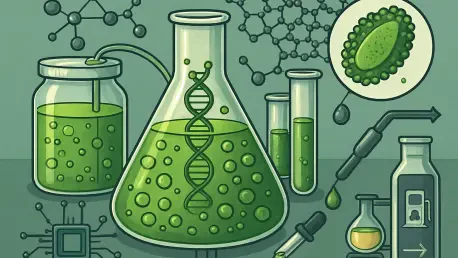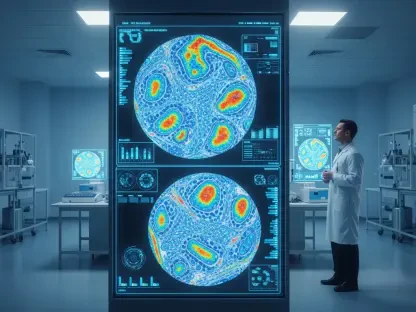Recent strides in nanotechnology have opened up new possibilities in sustainable biofuel production, specifically from microalgae. This cutting-edge approach offers transformative potential that could reshape energy industries by improving the yield and efficiency of biofuel from algae, a promising and eco-friendly alternative to fossil fuels. Pioneering research conducted at the University of Texas at El Paso has unveiled a method that harnesses nanotechnology to significantly boost the lipid content in Chlorella vulgaris, a freshwater microalga known for its biofuel potential. By leveraging zinc oxide nanoparticles, researchers have achieved a remarkable improvement in lipid production, highlighting a quantum leap in the quest for more viable and sustainable biofuel solutions. This advancement proposes a significant reduction in reliance on traditional fossil fuels and presents a compelling economic and environmental incentive to explore the intersection of nanotechnology and biofuels further.
Enhancing Algal Lipid Yield Through Nanotechnology
The heart of this advancement lies in the utilization of zinc oxide nanoparticles, which, when exposed to Chlorella vulgaris, enhance the algae’s lipid content from a modest 14% to an impressive 48%. This enhancement occurs when the concentration of zinc oxide is meticulously controlled between 30 to 50 mg/L, which, according to the study, is the optimal range for maximizing lipid output without causing oxidative damage to the microalgae cells. The surge in lipid content, essentially more than three times the baseline level, significantly solidifies algae’s standing as a viable source of biofuel, offering higher energy yields from the same biomass input. This efficiency is particularly striking when compared to traditional biofuel crops like corn, as algae can produce a far greater oil yield per acre. However, an overextension beyond the 50 mg/L concentration threshold was found to induce oxidative stress, which stands as a cautionary boundary for future research endeavors.
The innovative work has led the researchers to propose a holistic framework called the Biofuel Sustainability Score (BSS). This score evaluates the overall efficiency and sustainability of biofuel production. The BSS encompasses four main criterilipid content, biomass productivity, oxidative stress levels, and pigment retention. By taking these factors into account, the BSS ensures that biofuel production maintains balance and efficiency, thus promoting optimal conditions for large-scale applications. This framework aims to navigate the complexities of scaling up the process, which remains essential for commercial viability, and provide insights necessary for tailoring different species or conditions to maximize output.
Broader Implications and Future Prospects
The implications of these findings extend beyond the immediate benefits of increased lipid productivity. This research lays a foundational understanding for the future application of nanotechnology across various microalgal species and even macroalgal species, which could unlock further potential and efficiencies in the renewable energy sector. The broader adoption of this method could redefine biofuel production processes, making them not only more sustainable but also economically viable on a larger scale. Harnessing algae’s carbon-neutral properties while maximizing lipid yield could significantly contribute to reducing overall carbon emissions, an essential goal in tackling climate change challenges.
Looking forward, it will be crucial to refine these findings to suit different geographical, species-specific, and industrial contexts. While nanotechnology offers unprecedented potential, careful attention must be given to environmental impacts and the cumulative effects of introducing nanoparticles into ecosystems. As research continues, balancing innovation with ecological responsibility will be paramount to realizing the full promise of this breakthrough. Collaborations between biotechnologists, environmental scientists, and industry stakeholders can accelerate the responsible integration of nanotechnology into biofuel production, leading to scalable solutions that provide significant environmental benefits and contribute to the global renewable energy portfolio efforts.
Moving Toward a Sustainable Future
Advancements in nanotechnology are unlocking new opportunities in sustainable biofuel production, particularly using microalgae. This innovative method could revolutionize energy sectors by increasing the yield and efficiency of algae-based biofuel, a promising and eco-friendly alternative to fossil fuels. Researchers at the University of Texas at El Paso have discovered a technique using nanotechnology to almost double the lipid content in Chlorella vulgaris, a freshwater microalga renowned for its biofuel potential. By utilizing zinc oxide nanoparticles, they have dramatically enhanced lipid production, marking a significant breakthrough in the pursuit of more effective and sustainable biofuel solutions. This development not only reduces dependency on traditional fossil fuels but also offers economic and environmental incentives to explore further the integration of nanotechnology with biofuels. The melding of these fields could lead to not just energy transformation, but also a deeper understanding and utilization of minimal environmental impact fuel sources.









